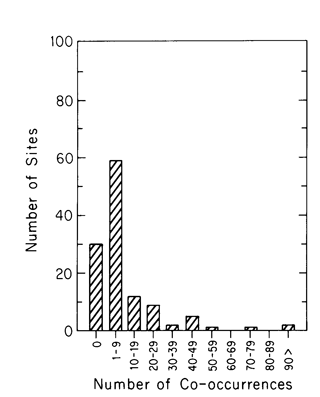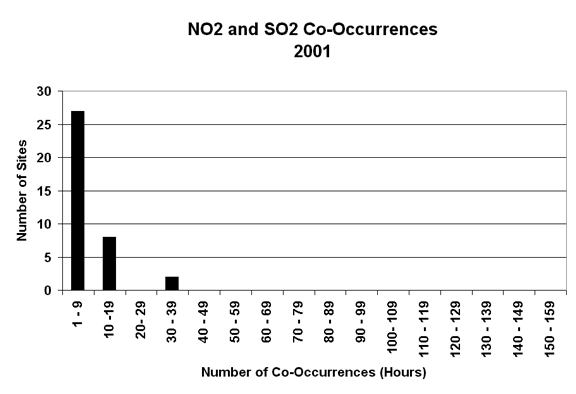Co-occurrence of
Sulfur Dioxide with Nitrogen Dioxide
Because elevated SO2 concentrations are
mostly associated with industrial activities (U.S. Environmental
Protection Agency, 1992), co-occurrence observations are usually
associated with monitors located near these types of sources.
Lefohn and Tingey (1984) reported that, for the rural and nonrural
monitoring sites investigated, most of the sites analyzed experienced
fewer than 10 co-occurrences (when both pollutants were present
at an hourly average concentration greater than or equal to 0.05
ppm) for SO2 and NO2. Figure 1 illustrates the simultaneous co-occurrence
results reported by Lefohn and Tingey (1984).
Using 2001 data from the EPA AQS database,
patterns that showed air pollutant pairs of SO2/NO2 appearing
at the same hour of the day at concentrations equal to or greater
0.05 ppm were characterized. The data were not segregated by
location settings categories (i.e., rural, suburban, and urban
and center city) or land use types (i.e., agricultural, commercial,
desert, forest, industrial, mobile, or residential). Data capture
was not a consideration in the analysis. In 2001, there were
188 monitoring sites that co-monitored SO2 and NO2. Because of
possible missing hourly average concentration data during periods
when co-monitoring may have occurred, no attempt was made to
characterize the number of co-occurrences in the 0 category.
Thus, co-occurrence patterns were identified for those monitoring
sites that experienced one or more co-occurrences.

Figure 1. The co-occurrence pattern for
sulfur dioxide and nitrogen dioxide (Source: Lefohn and Tingey,
1984).
Figure 2 illustrates the results of the
analysis. Similar to the results reported by Lefohn and Tingey
(1984), most of the co-located monitoring sites analyzed, using
the 2001 data, experienced fewer than 10 co-occurrences (when
both pollutants were present at an hourly average concentration
greater than or equal to 0.05 ppm).

Figure 2. The co-occurrence pattern for
sulfur dioxide and nitrogen dioxide using 2001 data from AQS.
The information on this web page can be
referenced as Lefohn, A.S. (2006). Co-occurrence of Sulfur Dioxide
with Nitrogen Dioxide. http://www.asl-associates.com/co_occurrence_SO2_NO2.htm.
References
Lefohn, A. S.; Tingey, D. T. (1984) The
co-occurrence of potentially phytotoxic concentrations of various
gaseous air pollutants. Atmos. Environ. 18: 2521-2526.
Lefohn, A. S.; Davis, C. E.; Jones, C.
K.; Tingey, D. T.; Hogsett, W. E. (1987) Co-occurrence patterns
of gaseous air pollutant pairs at different minimum concentrations
in the United States. Atmos. Environ. 21: 2435-2444.
U.S. Environmental Protection Agency. (1992)
National Air Quality and Emissions Trends Report, 1991. Research
Triangle Park, NC: U.S. Environmental Protection Agency, Office
of Air Quality Planning and Standards; report no. EPA/450-R-92-001.
Available from: NTIS, Springfield, VA; PB93-143998.